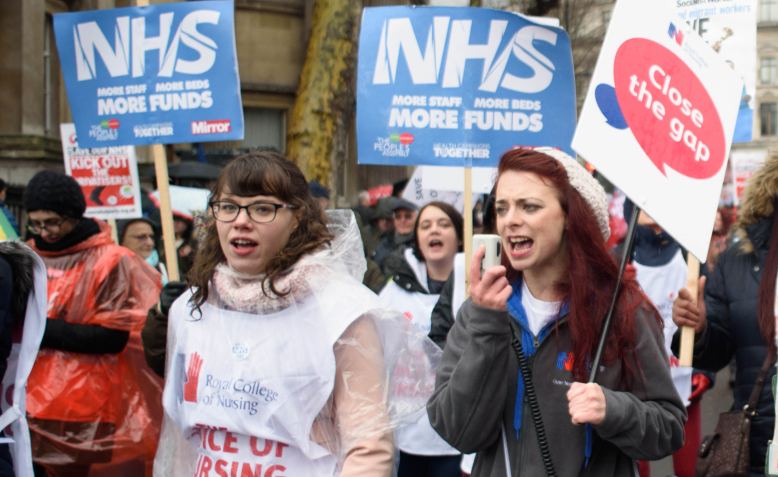 RCN members marching on the People's Assembly demonstration for the NHS, 2018. Photo: Jim Aindow
RCN members marching on the People's Assembly demonstration for the NHS, 2018. Photo: Jim Aindow
The vote by nurses to strike shows a level of frustration with conditions inside the NHS and poverty pay, but also a determination to join other workers in opposing the government. Caitlin Southern, a health worker in the north of England, explains why this struggle deserves our solidarity
For the first time in their history, members of the Royal College of Nursing have voted to strike. Nurses have backed their union’s campaign to take industrial action over pay and conditions. Reflecting the depths of the social crisis affecting the nation, and rightly furious over yet another insulting real terms pay cut, nurses are breaking their long tradition of dutiful silence to speak out. Nurses in Scotland and the north of Ireland will all take action. In England and Wales, because of the anti-union laws, a minority of NHS trusts did not achieve the required turnout. Nonetheless, a majority of nurses here too will be taking action.
The RCN has previously avoided industrial action because they felt that it was not in the interests of patient safety but the current situation demonstrates the shortcomings of that position. Staffing levels have been unsafe for years as healthcare workers have faced the brutality of over a decade of Tory-led austerity and now the crisis in our hospitals has reached an unsustainable level.
Nurses are increasingly using food banks and opting out of the NHS pension scheme as they need every penny in the midst of an economic crisis caused by the failures of corporate greed. By refusing to pay nursing staff fairly, the government is forcing them to sacrifice their future wellbeing in order to mitigate their current need. These conditions are contributing to the mass exodus of nurses from the NHS as, worn out from the pressures of both austerity and Covid, sick of being undervalued, they are turning to less stressful and higher paying employment.
After a summer of popular industrial unrest in other sectors, NHS workers are finding their voices amid a wave of support. By the very nature of their work, nurses have a unique emotional appeal that generates sympathy from a majority of the population. The task of the RCN now is to translate that sympathy into mass support for the nurses and resistance to attacks from the government and media that will try to cast pandemic heroes as pantomime villains. Both of these descriptions dehumanise nurses, turning them from workers who deserve a living wage into either angels who do the job for the love of it or as entitled scroungers, neither of whom need a pay rise.
The RCN must overcome its historical conservativism and work with other health unions to escalate this from a pay dispute into a demand for safe staffing levels and adequate funding across the health service to address the vicious cycle of staff shortages and increasingly rapid burnout.
This ballot signals a new phase in the battle for the future of the NHS. It is past time for health workers to take a stand, a successful strike ballot for the RCN must be used as a precedent to mobilise support for the other health union ballots this autumn. The government has shown that they have no interest in protecting our NHS or the workers who take care of us at our most vulnerable so it falls to us to build and defend the coming health service strikes.
Before you go
Counterfire is growing faster than ever before
We need to raise £20,000 as we are having to expand operations. We are moving to a bigger, better central office, upping our print run and distribution, buying a new printer, new computers and employing more staff.

